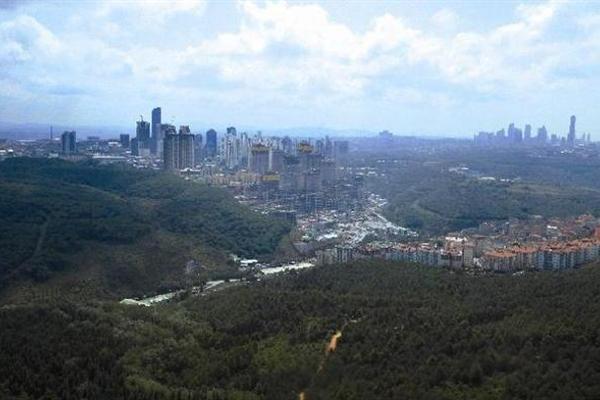Istanbul makes audacious bid to be named European Green Capital 2017
ISTANBUL


Istanbul has witnessed a major construction spree in the last years under the banner of 'urban transformation,' particularly in terms of residential complexes. HÜRRİYET Photo
Proud of its environmental policies despite activists’ outcry over gargantuan projects leading to massive deforestation around the city, Istanbul Metropolitan Municipality has entered a competition to be chosen as European Green Capital of 2017.Istanbul will compete against 11 other cities, including the Turkish city of Bursa, which has also entered the race along with Lisbon, Porto, Cork, Nijmegen and others, according to a EU Commission press release.
The competition awards the city that best offers “pioneering innovative solutions to environmental challenges” by setting “high standards in sustainable urban development” and, above all, “listening to what their citizens want,” the Commission stated.
The application for the competition comes at a time when environmental associations have been increasing their voice against the third bridge and third airport projects, which are expected lead to the cutting down of millions of trees.
The Gezi Park protests in 2013, which exploded across the country following repeated police crackdowns, was sparked by a municipal plan backed by then-Prime Minister Recep Tayyip Erdoğan to redevelop a small but central park in the middle of the city’s entertainment area.
Police have also recently been resorting to force to remove protesters in the Asian-side neighborhood of Acıbadem, who are critical of the local municipality for forging ahead with plans to construct a mosque in the Validebağ grove green space, even though a court has ordered a halt to construction.
The expert panel will assess the competitors on 12 benchmarks and indicators, including public transportation, waste treatment, water management, energy performance and adaptation to climate change.
According to the British consulting agency World Cities Culture Forum, the ratio of park and green spaces in metropolitan Istanbul is a mere 1.5 percent. The figure is far behind European capitals such as London (38.4 percent), Paris (9.40 percent) and Berlin (14.4 percent). It is also lower compared to other metropoles, including Shanghai (2.6 percent), Mumbai (2.5 percent) or Seoul (2.3 percent).
Istanbul has witnessed a major construction spree in the last years under the banner of “urban transformation,” particularly in terms of residential complexes. Activists are concerned that major projects, such as the third bridge, the third airport and Canal Istanbul will lead to the destruction of the few green areas left in the city.
Istanbul Mayor Kadir Topbaş, who was heavily criticized during the Gezi Park protests, had emphasized “the necessity of making some sacrifices” regarding those projects during an interview with private broadcaster CNN Türk last May.
“Those areas don’t involve tall trees, there are rather macquis groves. Trees will be planted afterwards. We have planted millions of trees. If you look at old Turkish movies, you will see that Istanbul was not as green before as it is now,” Topbaş said.
EU Environment Commissioner Janez Potocnik described the European Green Capital Award as "a mark of excellence for cities cherishing their environment. The winners to date have provided inspiring examples of how cities can change."
The title is currently held by Copenhagen and will be handed over to the British city of Bristol next year before passing to Slovenian capital Ljubljana for 2016.
